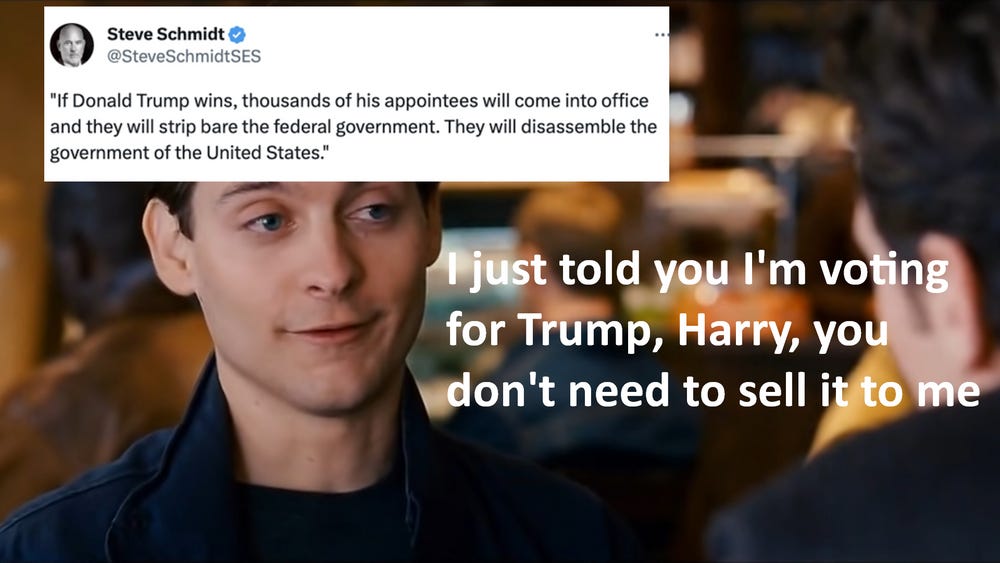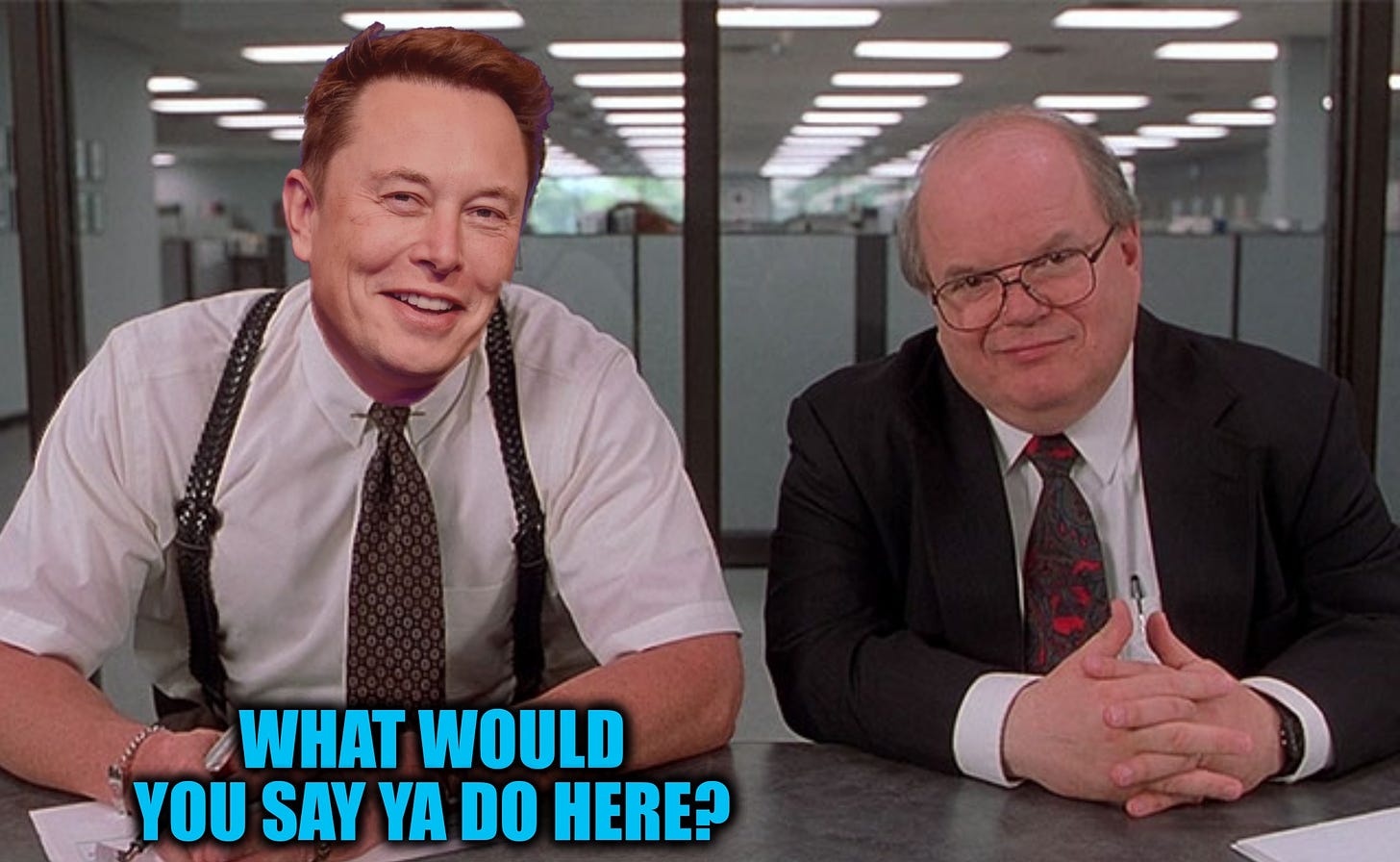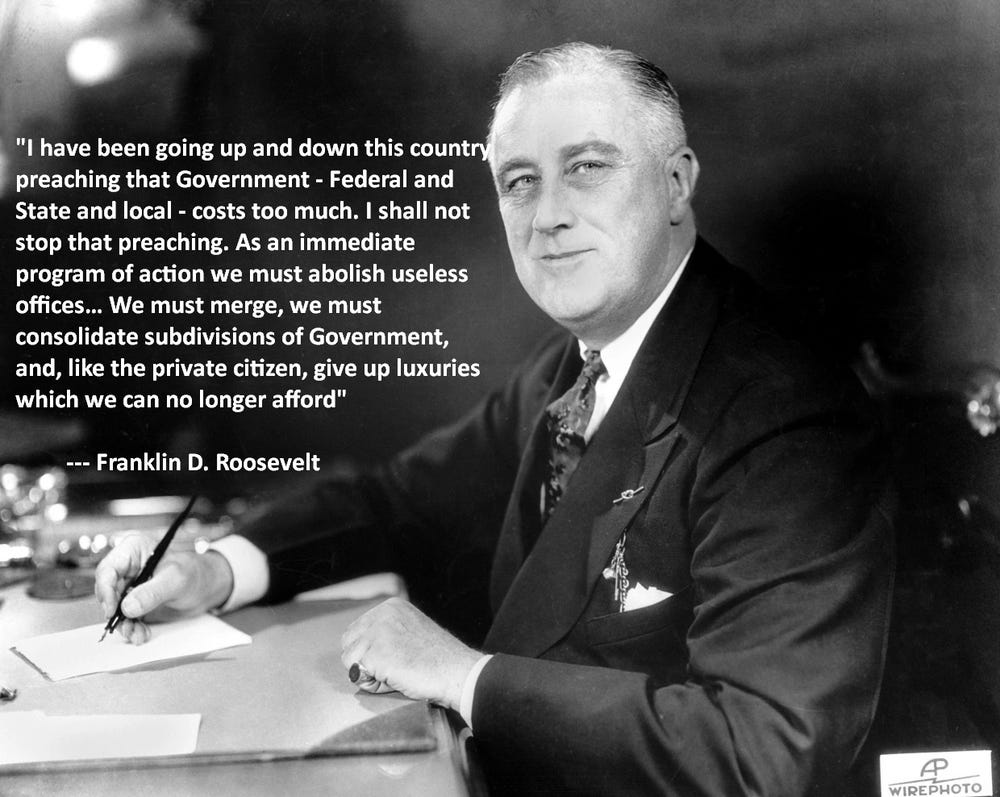Eric Cowperthwaite has written what I think is the best summary of why Trump won in 2024
In particular he identifies the coalition that was key. Trump got the private sector workers and bosses (and their spouses). He (and others) suggest this coalition replaces the one from 1980
In 1980, Reagan built a coalition of western libertarians, southern conservatives, and christian evangelicals. This coalition impacted the GOP and its political structure for 30 years.
I think that’s sort of true and sort of not. So this statement from another more lefty substack1 is probably wrong:
For one, Harris’ quite reasonable attempt to win by luring Trump-hating Nikki Haley supporters from the GOP to the Democratic Party with warm endorsements from Liz Cheney and other Republicans was a dead end. Even if some of those people made such a cross-partisan pilgrimage, they were vastly outnumbered by others who either moved over to Trump or just neglected to vote.
Which means Reaganism is now well and truly dead, with no substantial base in either party.
It’s wrong because the Liz Cheney republican types (the neocons mostly) weren’t actually the Reagan coalition, they just talked the talk enough to appear like they were while actually being a part of the Bureaucratic Deep State.
So to a degree what we’re seeing is a revitalization of the Reagan coalition because the overlap between “western libertarians, southern conservatives, and christian evangelicals” and people who work in private industry is quite high. I think mostly the Trump coalition embraces and extends the Reagan one. Catholics were, AIUI, generally absent from Reagan voters. Ethnic minorities generally were too. In 2024 the new Trump electorate has both and many Jews too - another group who used to be strongly Democrat.
I think the new coalition is likely to be durable and extendable. Members of the coalition respect those who have religious beliefs but don’t require specific ones. Hence an Amish Trump voter can be welcomed by his Mormon gun-loving plumber neighbor and the gay guy who owns the local McDonald’s franchise (and vice versa). What I think the left failed to understand is that religious Trump voters are quite clear on the separation of church and state (render unto Caesar…) while the left with their pseudo-religions of wokeism and climate-change are not. So the Trump voting religious are not voting for Trump because they want him to introduce a theocracy or turn the US into a new version of the Puritan colonies in the 1600s, they vote for him because they understand that he will make sure the federal government respects their beliefs and allows them to get on with life as they choose.
The left tried to stoke up two medical/ethical issues - “abortion rights” and “transgender rights”. On abortion, they failed because, for the most part, Trump voters agree with Dobbs which said abortion is a state issue and they agreed with Trump’s position that he was going to leave it to the states. On the whole I’d expect Trump voters to be mostly anti-abortion, but I’m sure plenty are “ weakly pro-choice” because that seems to be a common position2.
On transgender rights they lost decisively because transgender activists are bullies who try to use the power of the state to coerce things their way and then lie when things go against them. Trump supporters don’t want their children groomed into a cult, they don’t want their (wives and) daughters exposed to creepy cross-dressers, and so on.
Relatedly, I don’t think the progressive left understand just how much the Trump coalition people hate DIE. They absolutely hate the DIE insanities that sees them passed over for jobs and promotions with their places taken by incompetents who can play the right victim cards. They don’t appreciate being told they are instinctively racist/sexist, they don’t like labels like Latinx and the implicit erasing of gender in the label, and so on. In fact, if Trump fails to use his pen to erase large chunks of federally mandated DIE crap in his first days in office he’s going to need to explain why not.
That leads to the other religious issue of the left - climate change. Voters are not, in aggregate, idiots. They don’t like electric cars or bird choppers. They like low cost energy and gasoline. They can see that renewable energy is mostly a scam and they don’t want it. They want the electrical grid to give them the watts they need when they want them and to do so reliably and cheaply. They want cars/trucks that are affordable and work for all seasons and all use-cases including driving 500 miles to help a friend move etc.
The progressive left has mostly seized the reigns of the administrative state and adjacent non-productive parts of the economy. They thought that this meant they would have control of everything and a compliant media would feed propaganda about how wonderful the rainbow unicorn farts were and everyone would be happy. And for a while they kind of did. The trick is they over-used the control and propaganda and people noticed - see Covidiocy, vax mandates etc. And then once Americans noticed that then they noticed all the other BS, from trans grooming in schools to ridiculous environmental impact surveys to 10001 other petty pointless bureaucratic cruft that results in 10 goons invading a peaceful home to kill a squirrel and a raccoon.
So the worker, builder (and owner) classes have a common enemy which is the bureaucrat class and Trump has managed to get most of the worker, builder (and owner) classes on his side. So now he needs to deliver on the promises he made to his voters and get serious about cutting government Milei style.
The good news is that he saw in his first term how the Deep State would block and leak and generally fail to do what it was told to do. He also discovered the hard way that there are vanishingly few people who work in the federal government or DC based institutions who can be trusted. He’s had four years to plan and now he’s got some excellent builder CEO sorts (e.g. Musk, but not just Musk) and finance sorts (e.g. Bill Ackman) who can help find the deadwood and remove it wholesale. One assumes that there will be a large number of executive orders signed in the last 10 days of January that implement the first phase of this.
We know the obvious targets:- the Department of Education, the diversity HR groups across the place, the politicized top of the security agencies and so on. And no doubt Trump, Musk and co. have plans to cull them. They probably also have plans to cut the funding for “research” that is just a nice wrap on some communism and other ways to slash the impact of progressives in society. The wailing and gnashing of teeth when universities, for example, have to choose between wokeness and losing federal funding will be truly schadenbonerlicious.
Even better Trump can say he’s simply following in the steps of FDR
But that’s not enough. The US needs to have a way to permanently rein in the bureaucrats. That’s hard. In fact it has never been done before. Most (all?) empires in history have failed and been overthrown because they became too bureaucratic to react properly to external threats. In Argentina, Milei is taking a chainsaw to the government, Trump will no doubt try the same, but that isn’t enough. Apart from anything else there are non-governmental parasites (both non-profit and allegedly corporate) who benefit from the bloated federal government/budget and those need to be removed too.
Some bright people need to ponder how to set up a system so that bureaucrats and parasites are kept in check. It’s not an easy problem. As I noted elsewhere in a private forum, the person who comes up with that will deserve a Nobel Prize. I also, in a different elsewhere, had a scheme of mine comprehensively shot down as unworkable today, so back to the drawing board. I am coming up with other ideas and others need to do the same.
The trick, “as eny fule kno”, is to align incentives properly. Probably that means a part of the government that is paid by the amount of money it saves but it’s not as simple as you would hope because there are always secondary, tertiary etc. consequences and incentives. One obvious one is the incentive for a bureaucrat or private entity that benefits from that bit of the state to bribe the relevant repealers to not touch their corner. The good news though, is that the creative parts of the worker/builder coalition, the people who found startups and invent new things, are highly incentivized to solve this problem so that they can get on with their real interest - new shiny stuff!
The weak pro-choice position is that its ikky but OK for the first 2-4 months, not afterwards except when its a medical survival issue for the mother. See this substack for lots on that and how various groups break down beyond that overall view.












I've always argued the growth of the administrative state is tied to the rise of the so-called professional civil servants. Go back to the patronage system, which amply solves the principal-agent problem currently plaguing the government.
A president would only have so many trusted lackeys and cronies (I mean them in a positive sense) he can count on, and would be loathe to let anybody outside that trusted circle hold any significant power, and by default, that means these functions outside of their control would be abolished.
Would there still be bureaucrats and parasites? Of course. The trick is that instead of blaming problems and poor policies on a nebulous 'deep state', the patronage system effectively ties everything back through the assigned cronies to the boss - the president, who holds ultimate accountability.
In theory, this would effectively shrink the government.
I agree with your analysis but you do make one categorical error. You wrote "Catholics were, AIUI, generally absent from Reagan voters." In fact, "Catholics," which is to say, ethnic (Irish, Italian, Polish, Slovak, and so on) blue-collars in the Northeast and Midwest, were transitioning out of the Democratic party of their forefathers as far back as the 1960s. Those blue-collars figured prominently in the Wallace movement, largely in response to their abandonment by the Democratic Party in favor of blacks. Blue-collars then became part of Nixon's 1972 landslide, in part because of the endorsement of the Teamsters, which in turn was triggered by the Hardhat Riot (look it up, well worth it) and its aftermath. Later they helped propel Reagan into office as "Reagan Democrats" and spawned a decade of Midwest Republican governance in Michigan, Wisconsin, and even Minnesota. In fact Northern and Midwestern Catholics were on a parallel trajectory with Southern Evangelicals and for many of the same reasons.